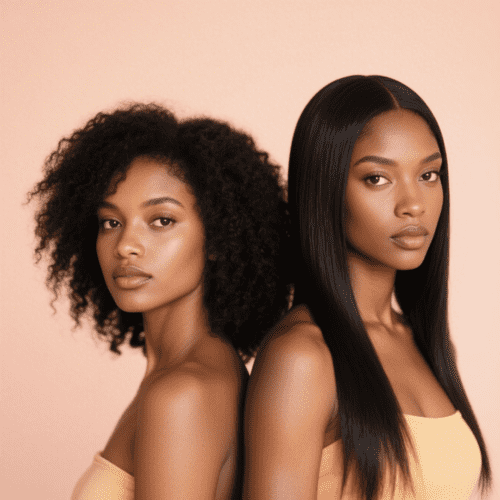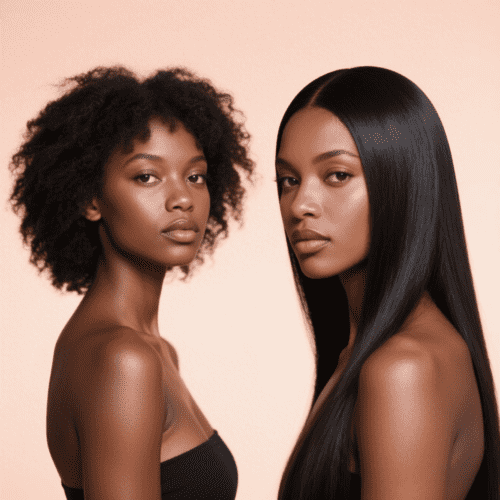
Can Black People Have Naturally Straight Hair?
Hair is like a fingerprint—utterly unique. But when it comes to Black hair, stereotypes often overshadow its stunning diversity. One question that pops up again and again: Can Black people have naturally straight hair? Let’s unpack the science and history behind this often misunderstood topic.

Source: Canva
How Genes and Environment Shape Black Hair Texture
For many people of African descent, genetic inheritance leans toward tightly coiled or kinky textures due to ancestral adaptations to climate.
The Role of Genes in Hair Texture
Hair texture—whether curly, coily, wavy, or straight—is determined by the shape of the hair follicle . Oval or asymmetrical follicles produce curly or coiled strands, while perfectly round follicles create straight hair.
Climate’s Hidden Hand in Evolution
The environment quietly steers evolution. In Africa’s intense sunlight, tightly coiled hair became a multitasking marvel: its structure shielded scalps from UV damage while promoting sweat-based cooling. Meanwhile, straighter hair types—common in cooler regions—evolved to trap warmth. These adaptations weren’t random quirks but survival tools etched into our DNA.
Today, this legacy is still seen in those of African descent, even if environmental pressures no longer play such a defining role in shaping hair textures for Black communities worldwide.
Why Some Black Hair Is Naturally Straight
Some Black individuals inherit straighter hair naturally due to:
★ Genetic variations: Historical migrations and mixed heritage can shuffle the texture deck. And of course, genetics isn’t always predictable—some people are simply born with straight hair, even without known mixed ancestry.
★ Regional differences: Populations in parts of East Africa or Madagascar, for instance, sometimes exhibit looser textures.
We can say that hair morphology is a continuum. While tightly coiled hair is common among people of African descent, it’s not a monolith—textures can vary widely within families.
Straight Hair in Black Communities: A Historical Lens

Source: Canva
Straight hair in Black communities isn’t just about genetics—it’s tied to a long and complicated history. During colonial times, Eurocentric beauty standards deemed straight hair more “professional” and “acceptable,” feeding into harmful ideas around respectability and identity. That legacy still lingers today, showing up in everything from workplace discrimination to the subtle (or not-so-subtle) bias against beautiful natural Black hairstyles like afros, braids, and locs.
It's important to challenge the narrow definitions of what Black hair is “supposed” to look like. For too long, straight hair has been positioned as the standard of beauty, often leading to erasure or judgment of natural Black textures, and even surprise when a Black person has naturally straight or looser hair.
All Black hair is valid!!! Whether it's 4C, 3A, or bone-straight hair tells a story of resilience, diversity, and self-expression.
How to Get Straight Hair: Quick Tips & Healthy Alternatives
While embracing natural texture is empowering, some folks love experimenting! If you’re curious about straight styles, here’s a no-judgment rundown:
✨ Hair Straightener
◆ Use a ceramic flat iron on clean, dry hair.
◆ Always apply heat protectant—skip this, and you’ll regret it!
Pro tip: Wrap hair in a silk scarf post-styling to lock in sleekness.
Related post: What Is the Difference between Hot Combs and Flat Irons
✨ Temporary Straightening
◆ Blowouts with a paddle brush give silky results that last 1-3 days.
◆ Try African threading techniques for heat-free straightening (hello, cultural hack!).
✨ Chemical Relaxers
◆ Relaxers permanently alter hair bonds—consult a pro to avoid damage.
◆ Patch-test first! Allergies are no joke.
Protective styling can be fun and low-maintenance. If you’re exploring that route, high-quality wigs and bundles, like these 100% human hair options, offer versatility without commitment.
Celebrate Your Hair Journey
For generations, Black women have found power and pride in their hair, whether through care routines passed down from grandmothers or self-love in front of the mirror. Your journey is a celebration of that legacy!

Submit Your comment